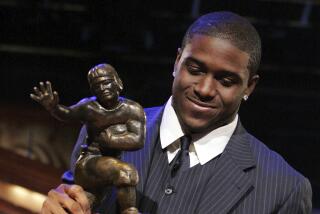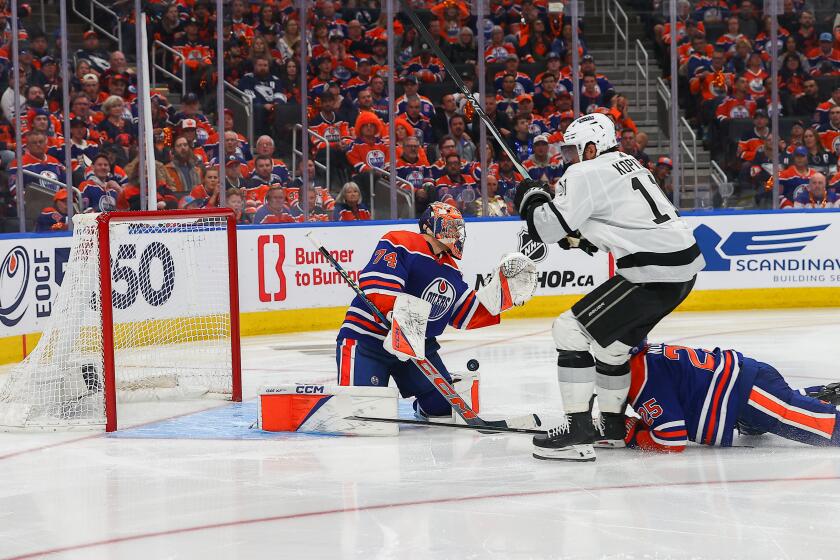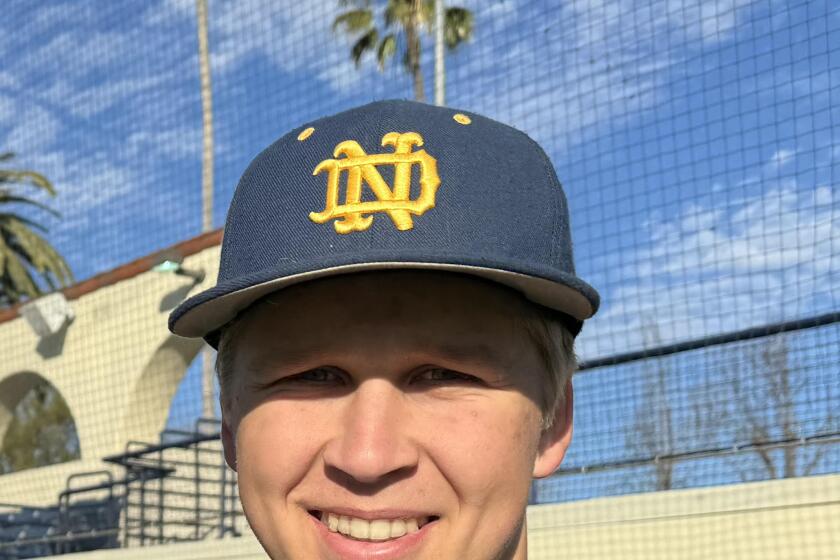A long way from the summer of 42
With his smarts and his speed, he was one of the sneakiest players in baseball.
And so, 60 years later, is it any surprise that Jackie Robinson is fooling everyone again?
For the record:
12:00 a.m. April 18, 2007 For The Record
Los Angeles Times Wednesday April 18, 2007 Home Edition Main News Part A Page 2 National Desk 2 inches; 105 words Type of Material: Correction
Baseball: In Sunday’s Sports section, a sentence at the top of the cover package on Jackie Robinson credited him with being the first black man to play in a major league baseball game. Robinson was the first to play in the modern era, but at least two African Americans played in the 1800s. Brothers Moses Fleetwood Walker and Welday Walker played with the Toledo Blue Stockings of the American Assn., then a major league, in 1884. A photo caption with the same story said that Jackie Robinson was a three-sport star at UCLA. He starred in four sports: baseball, football, track and field and basketball.
In festivities throughout the major leagues today, baseball will celebrate the anniversary of Robinson’s breaking its color barrier.
But, just as when he stole home in the 1955 World Series, Robinson will not be where everyone is looking.
And by the time he is found, it will be too late.
The focus of today’s party will be on the field, where players of all colored jerseys and skin will don Robinson’s No. 42.
Six entire teams will wear it. Coaches will wear it. A manager will wear it. Concessionaires will sell it and fans will wave it and embrace it.
For one day, with videos and speeches and standing ovations, Jackie Robinson will come alive.
In the one place where he is most dead.
Jackie Robinson, it turns out, did little to change the African American influence on baseball. Today it is a Caucasian and Latino pastime, both on the field and in the stands.
Only 8.3% of the players on opening-day rosters were African American, a huge drop from the 27% total in the mid-1970s.
There are only two African American managers. There is only one African American general manager.
In the stands, witnesses don’t need a Harris Poll to know that only 7% of African American adults say that baseball is their favorite sport.
With higher salaries available quicker, basketball and football have long since surpassed baseball as the sport of choice for the top inner-city athlete.
With few African Americans on the field or in the dugout, the game has lost its appeal to the inner-city fan.
“When it comes to people following in his footsteps on the baseball field, Jack’s impact seems to have been forgotten,” said Don Newcombe, Robinson’s last living African American teammate.
But follow those footsteps elsewhere.
Leave Dodger Stadium after today’s late-afternoon ceremonies and head south to a more fitting, living tribute to No. 42.
Drive into the Crenshaw district. Pull into a huge expanse of faded green and chipped aluminum known as Rancho Cienega Park.
Walk behind the gym and underneath some stands and into a football stadium with dying grass and a chunky track. Check out the tarnished plaque on the concession stand wall.
There is a bronze bust of a man who barely looks like Jackie Robinson. But underneath his face, the words are clear.
“For serving as an inspiration to the nation’s youth, this stadium is named Jackie Robinson Sports Stadium.”
It is one of many Robinson memorials throughout the country, and one of several in Robinson’s Southern California homeland. But this may have been the first, dedicated by Mayor Tom Bradley in 1973, barely a year after Robinson’s death.
Spend five minutes here and realize that perhaps none represent his legacy better.
You want to celebrate the No. 42?
On this weekday evening, there are at last 42 sprinters and joggers and walkers filling the track.
There are perhaps 42 different shades of skin color among the soccer players filling the field.
There are at least 42 children laughing and jumping and celebrating the freedom to play whatever sport they want -- from cheerleading to rope jumping to javelin throwing.
And every one of those children answers my question correctly.
Who was Jackie Robinson?
“He was like Martin Luther King and Rosa Parks,” says Alvin Clark, 12.
Why was Jackie Robinson important?
“He inspired people to do things,” says Matthew Golden, 12.
How does his impact live today?
“Before Jackie Robinson, there was white and black,” says L.J. Martin, 9. “Now there is both.”
*
Jackie Robinson Sports Stadium is officially open from 5 a.m. until 10:30 p.m.
But, like Robinson, it refuses to limit itself.
Businessmen are exercising here in the dark at 3 a.m. Moms are climbing through the fences to jog here at sunrise. Virtually any time of day or night, you will find somebody playing a sport here.
There may be no free athletic facility in the city that gets such continuous use. Just look at the track, which resembles a faded pair of dark-red corduroys with holes in the knees and hips.
“There is no other track around that is even close to being this worn down,” said Dwayne Golden, Matthew’s father. “There is always somebody out here. Always.”
With all due respect to the ceremonies surrounding today’s 5 p.m. game and celebration at Dodger Stadium, nothing touched by Jackie Robinson today could be as beautiful as his sports stadium last week.
A middle-aged man strides down the track in slacks and a T-shirt as three young sprinters in fancy running shoes flow around him.
Two giggling girls holding school books are walking and gossiping. Two other giggling girls are jumping over hurdles. A couple of tiny girls are racing Big Wheels between them.
A family of four from Eastern Europe plays soccer in one end zone. A couple dozen Latino men play soccer in the other end zone.
The field and track seem impossibly crowded, but there are no collisions, no confrontations, everyone giving up just enough space to make it work.
“Jackie Robinson wasn’t a baseball thing, it was a humanity thing,” says David Garrison, the coach of the L.A. Jets youth track team that runs around him. “Jackie Robinson taught this country the idea of, ‘You’re no different than me.’ ”
Walking across this weed-choked field at sunset, it is obvious that Robinson integrated far more than a baseball diamond. He integrated a soul.
He took his country’s common language -- sports -- and made it accessible for all. He didn’t just break baseball’s color barrier, he began the deconstruction of all athletic barriers.
Where sports was once one of the worst parts of a segregated society, today it is the most color-blind aspect of that society.
Even baseball’s lack of African Americans isn’t largely because of racism, but a lack of African Americans entering the sport. The power-hitting first basemen are now powerful tight ends. The great center fielders have become point guards. Baseball can’t use what baseball doesn’t have.
And it’s naive to expect baseball to set up the sort of inner-city academies that exist in Latin America, simply because Latin American players are not subject to the draft like American players. Why should the Dodgers spend thousands grooming a kid from Compton who could be drafted by the Giants?
To suggest that Jackie Robinson’s legacy has failed baseball is to unfairly tarnish that legacy.
It was never about a baseball field. It was about all fields, including one in the middle of Los Angeles where the anniversary of his first game is celebrated every day, in different languages, in different colors, under a single inspiration that can be found etched onto Jackie Robinson’s Brooklyn tombstone.
“A life is not important except in the impact it has on other lives.”
Those lives are not only the ones you will see wearing No. 42 today.
Those lives are ours.
--
Bill Plaschke can be reached at bill.plaschke@latimes.com. To read previous columns by Plaschke, go to latimes.com/plaschke.
*
(BEGIN TEXT OF INFOBOX)
In debut, Robinson got a leg up on history
The story the Associated Press wrote for Jackie Robinson’s debut with the Brooklyn Dodgers on April 15, 1947:
BROOKLYN -- Pete Reiser, key to Brooklyn’s flag chances, blazed a seventh-inning double off the screen a foot inside the right-field foul line at Ebbets Field today to drive across the tying and winning runs as the pilotless Dodgers opened their 1947 campaign with a 5-to-3 victory over the Boston Braves.
Although he did not get a hit in four official times at bat, Jackie Robinson, first Negro to play in modern big league ball, signalized his official debut as a Dodger by sprinting home with the deciding run on Reiser’s smash and playing perfect ball at first base.
Reiser’s hit, his second off Johnny Sain, was only the sixth produced by the Dodgers, and it was their last as Mort Cooper and Anton Karl combined the rest of the way to hold them in check. Boston made eight blows off lefty Joe Hatten and Hal Gregg, who relieved after Hatten had been lifted for a pinch hitter in the sixth.
With Brooklyn trailing, 3-2, to open the seventh, Eddie Stanky led off with a walk, bringing up Robinson. The Negro in three previous attempts had done no better than hit into a double-play, roll to shortstop and loft an easy fly to left. This time he laid down a perfect bunt midway to the pitcher’s box and tore for first. Earl Torgeson grabbed the sphere and made a hard, hurried peg to first that hit Robinson on the leg and rocketed on into right field.
Robinson had no difficulty reaching second and Stanky pulled up at third. Reiser then weighed in with his double, a terrific clout. Reiser then scooted home with the fifth and unneeded run on Gene Hermanski’s fly to deep center.
A disappointing crowd of only 25,623 paid to see the Dodgers get away in front of one of their main rivals for the National League flag.
More to Read
Get our high school sports newsletter
Prep Rally is devoted to the SoCal high school sports experience, bringing you scores, stories and a behind-the-scenes look at what makes prep sports so popular.
You may occasionally receive promotional content from the Los Angeles Times.







